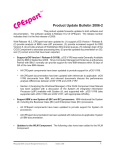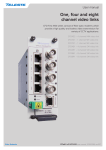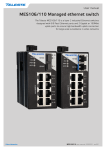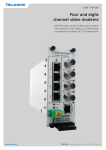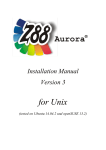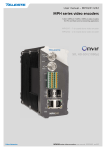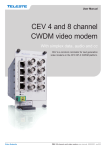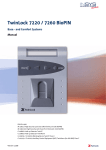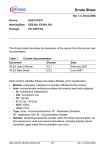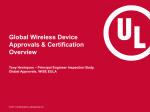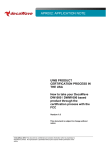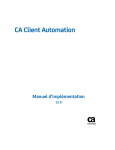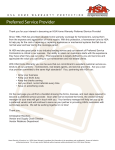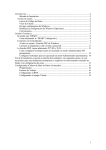Download CPExpert Release 16.1
Transcript
Product Update Bulletin 2006-1 This product update forwards updates to both software and documentation. The software update is Release 16.1 of CPExpert. The release number indicates that it is the first release of 2006. With Release 16.1, CPExpert has been updated to: (1) provide updates to the CICS Component. (2) provide updated documentation on CD; and (3) correct errors that have been reported. • Updates to the CICS Component. The development work in this update primarily concerns the CICS Component. The CICS Component has been updated in the following areas. • Added new rules. The following rules have been added to the CICS Component: • Rule CIC114 (CICS encountered a Critical Storage condition) reports that the CICS region encountered a critical storage condition that required the CICS storage cushion to be released. • CIC310 (LGDFINT value in SIT might be too large) reports that the LGDFINT value might have been incorrectly specified in the System Initialization Table, and that the LGDFINT value is too large. • Rule CIC311 (LGDFINT value in the SIT might be inappropriate for workloads) reports that the LGDFINT value in the System Initialization Table (SIT) might be inappropriate for workloads. • Rule CIC313 (Buffer Full condition occurred for CICS Log Manager buffer) reports that a Buffer Full condition occurred for the CICS Log Manager’s internal buffer. • Rule CIC315 (MAXBUFSIZE value is incorrect for log stream in CF structure) reports that the MAXBUFSIZE value was incorrectly specified for a CICS log stream that was located in a coupling facility structure. • Rule CIC316 (MAXBUFSIZE value is incorrect for DASD-only log stream) reports that the MAXBUFSIZE value was incorrectly specified for a CICS DASD-only log stream. • Rule CIC505 (Open S8 mode TCBs in use reached MAXSSLCBS limit) reports that the peak number of open (S8 mode) Task Control Blocks (TCBs) in use © Copyright 2006, Computer Management Sciences, Inc. April, 2006 1 CPExpert Product Update Bulletin 2006-1 reached the limit set by the MAXSSLTCBS parameter specified in the System Initialization Table (SIT). • Rule CIC506 (Peak open S8 mode TCBs in use approached MAXSSLCBS) reports that the peak number of open (S8 mode) TCBs in use was approaching the limit set by the MAXSSLTCBS parameter specified in the System Initialization Table. • Rule CIC507 (TCB attach failure occurred for S8 mode TCBs) reports that a TCB attach failure occurred when attempting to attach a TCB for S8 mode Secure Socket Layer (SSL) TCBs. • Rule CIC510 (Open XP mode TCBs in use reached MAXXPTCBS limit) reports that the peak number of open (X8 or X9 mode) TCBs in use reached the limit set by the MAXXPTCBS parameter specified in the System Initialization Table. • Rule CIC511 (Peak open XP mode TCBs in use approached MAXXPTCBS) reports that reports that the peak number of open (X8 or X9 mode) TCBs in use was approaching the limit set by the MAXXPTCBS parameter specified in the System Initialization Table. • Rule CIC530 (Open JVM mode TCBs in use reached MAXJVMTCBS limit) reports that peak number of open (JVM mode) TCBs in use reached the limit set by the MAXJVMTCBS parameter specified in the System Initialization Table. • Rule CIC531 (Peak open JVM mode TCBs in use approached MAXJVMTCBS) reports that peak number of open (JVM) TCBs in use was approaching the limit set by the MAXJVMTCBS parameter specified in the System Initialization Table (SIT). The JVM TCBs consist of J8 mode TCBs with CICS/TS Release 2.2, and consist of both J8 mode TCBs and J9 mode TCBs with CICS/TS Release 2.3. • Rule CIC533 (Excessive mismatch between JVM requests and free JVMs) reports that were excessive mismatches between program requests for a Java Virtual Machine (JVM), and unattached JVMs that had previously run a Java program with the same JVM profile and Access Key as the new request. • Rule CIC534 (Excessive J8/J9 TCB steals to satisfy JVM requests) reports that there were excessive steals between J8/J9 TCBs to satisfy program requests for a Java Virtual Machine. • Rule CIC540 (JVM J8 mode TCB profiles that participated in mismatch/steals) reports that there were excessive mismatch and steals between J8/J9 TCBs that were required to satisfy program requests for a Java Virtual Machine. This finding provides information about the JVM J8 (CICSKEY) TCB profiles that participated in mismatch and steals. • Rule CIC541 (JVM J9 mode TCB profiles that participated in mismatch/steals) reports that there were excessive mismatch and steals between J8/J9 TCBs that were required to satisfy program requests for a Java Virtual Machine. This finding © Copyright 2006, Computer Management Sciences, Inc. April, 2006 2 CPExpert Product Update Bulletin 2006-1 provides information about the JVM J9 (USERKEY) TCB profiles that participated in mismatch and steals. • • • Rule CIC570 (MAXSOCKETS limit was reached more than guidance) reports that the MAXSOCKETS limit was reached while CICS attempted to create a TCP/IP socket more times than the guidance provided to CPExpert. • Rule CIC571 (Excessive average number of delayed create socket requests) reports that the average number of create TCP/IP socket requests delayed waiting for MAXSOCKETS was more than the guidance provided to CPExpert. • Rule CIC572 (Excessive peak number of delayed create socket requests) reports that the peak number of create TCP/IP socket requests delayed waiting for MAXSOCKETS limit was more than the guidance • Rule CIC573 (Excessive average delay time due to MAXSOCKETS limit) reports that the average delay time of create TCP/IP socket requests delayed waiting for MAXSOCKETS limit was more than the guidance provided to CPExpert. • Rule CIC574 (Excessive total delay time due to MAXSOCKETS limit) reports that the total delay time of create TCP/IP socket requests delayed waiting for MAXSOCKETS limit was more than the guidance provided to CPExpert. • Rule CIC575 (Create socket requests timed out waiting for MAXSOCKETS) reports that the number of create TCP/IP socket requests that timed out while waiting for the number of sockets to fall below the MAXSOCKETS limit, was more than the guidance provided to CPExpert. Modified CICS Component rules. The following CICS Component rules have been modified: • CIC110 (CICS encountered a Short-on-Storage condition) has been revised to report only CICS Short-on-Storage conditions. • CIC290 (Open TCBs reached MAXOPENTCBS limit) has been revised to report on L9 mode TCBs in addition to L8 mode TCBs. • CIC291 (Peak TCBs in use approached MAXOPENTCBS) has been revised to report on L9 mode TCBs in addition to L8 mode TCBs. Increased the number of volumes in the CICS Component User Manual. With CPExpert Release 16.1, the documentation for the CICS Component rules has increased to the point that only one volume is unwieldy for users who wish hard-copy documentation. The CICS Component now has almost 850 pages of documentation. Consequently, I have added Volume 2 to the CICS Component User Manual. • Volume 1. Volume 1 contains instructions for installing the CICS Component, describes how to alter guidance variables to tailor the analysis to your site, and contains documentation for findings related to overall CICS performance, © Copyright 2006, Computer Management Sciences, Inc. April, 2006 3 CPExpert Product Update Bulletin 2006-1 dispatcher considerations, CICS VSAM file specifications, CICS temporary and transient data sets, CICS network problems, and CICS/DB2 interaction. • Volume 2. Volume 2 contains documentation for findings related to CICS Log Manager, CICS Shared Temporary Storage, CICS Shared data tables (including Coupling Facility Data Tables), CICS Open Transaction Environment (OTE) issues, and CICS TCP/IP performance. • Updates to the WLM Component. The main changes to the WLM Component for CPExpert Release 16.1 are to correct errors reported by users. • Updates to the DB2 Component. The main changes to the DB2 Component for CPExpert Release 16.1 are to correct minor errors reported by users. • Updates to the DASD Component. The main changes to the DASD Component for CPExpert Release 16.1 are to correct minor errors reported by users. • Updated documentation on CD. This release provides all updated documentation to reflect new or revised rules. The CPExpert documentation is accessible via Adobe Acrobat Reader. A free version of Adobe Acrobat Reader is available at http://www.adobe.com/products/acrobat/readstep2.html. • Add log of changes to code. I’ve added a log of changes to the CPExpert code for Release 16.1. This log is titled CHANGES and shows each module changed (except when the change is minor). Interested users can review the CHANGES log to see what code changes have been made, and can easily identify new guidance variables. I’ve followed the MXG model for releases (that is, the CHANGES log shows changes in the new release, while the CHANGESS log is an accumulation of changes). • Add log of errors reported. I’ve added a log of all errors reported by users. This error log is in the GENER151 module in SOURCE. FTP download CPExpert Release 16.1 (both code and documentation) is available via ftp download from my ftp server. If you prefer this method of obtaining the update, please send an email to [email protected] to obtain instructions for ftp download, obtain your user id, and obtain your password. Installation I suggest that you use the following steps to install Release 16.1: • Create a new PDS titled "prefix.CPEXPERT.V161.SOURCE". • Create a new PDS titled "prefix.CPEXPERT.V161.USOURCE". © Copyright 2006, Computer Management Sciences, Inc. April, 2006 4 CPExpert Product Update Bulletin 2006-1 • Install CPExpert into the "prefix.CPEXPERT.V161.SOURCE" using the normal installation procedures described in the CPExpert Installation Guide. • Copy your old USOURCE members into "prefix.CPEXPERT.V161.USOURCE". This step should be done so you do not have to recreate all of your unique parameters. Please remember that you MUST change any of the CHKxxxx guidance variables if you wish the WLM Component to analyze areas other than the basic analysis of the Service Policy and service class period performance constraints. • If you elected to receive updates to CPExpert on CD, the software is distributed on the CD that contains the CPExpert user documentation. • Installing CPExpert from CD to MVS. Copy the source.ebc file from cd:\source\source.ecb as binary, to CPEXPERT.TAPE.REL152, allocated as DSORG=PS,RECFM=FB,LRECL=80,BLKSIZE=0,AVGREC=K,SPACE(80,(150,50)), DSN=CPEXPERT.REL161.IEBUPDTE. The source.ecb file is in standard IEBUPDTE format. Use the JCL described in Exhibit 2-1 of the CPExpert Installation Guide to install the CPExpert software. Copy your old USOURCE members as described above. • Installing CPExpert from CD to PC: Copy the SOURCE directory on the CD to prefix\cpexpert\rel152\source. Copy your old USOURCE members as described above. Make sure that you update your USOURCE(GENGUIDE) member to specify %LET SOURCE =user_directory; statement to point to the new SOURCE directory. • If you have installed the CPExpert option to produce output to SAS Output Delivery System (ODS) and if you have exercised the LINKPDF option so you can “click” on a rule in the html output to see the documentation, please remember to load the new documentation onto your system. • If you chose to implement the xxxHTML option (e.g,. WLMHTML) to provide your own SAS ODS HTML statement parameters, please place your own macros into USOURCE and concatenate the USOURCE pds ahead of the SOURCE pds. Special note of SAS/ITRM users of CPExpert running the CICS Component: With CPExpert Release 16.1, you must have the following MXG file structures in your performance data base. MXG FILE CICPGR CICSJG CICSJR CICTCPIP CICTCPSJ CICTCPSO DESCRIPTION JVM PROGRAM RESOURCE STATISTICS CICS JVM POOL STATISTICS JVM PROFILE RESOURCE STATISTICS CICS TCP/IP SERVICE (SOCKETS) CICS JVMPOOL STATISTICS CICS TCP/IP SOCKETS GLOBAL © Copyright 2006, Computer Management Sciences, Inc. April, 2006 5 CPExpert Product Update Bulletin 2006-1 SAS gives an invalid return to the %sysfunc(exist(file)) macro with SAS/ITRM, so the above files must be in your pdb, even if they are null files. Thanks I would like to say "Thank you" to the following individuals. These folks have discovered errors, proposed new features, graciously sent me test data, or suggested documentation changes since the last Update Bulletin: Markus Bansemir (HUK-Coburg, Germany) Glenn Bowman (Wakefern Food Corporation, NJ) Craig Collins (State of Wisconsin, WI) Michael Duffy (Lloyds TSB, United Kingdom) Rodger Foreman (Transunion/ACXIOM, IL) Kris Ferrier (State of Washington, WA) Niek Greuter (IBM Global Services, Netherlands) Marnel Groebner (State of Washington) Chuck Hopf (MBNA, TX) Yaohua Hu (Insurance Services Organization, NJ) Chuck Knapp (United Health Technologies, WI) Hugh Lapham (Royal Canadian Mounted Police, Canada) Barry Merrill (Merrill Consultants, TX) Jim Murphy (Wakefern Food Corporation, NJ) Harald Seifert (HUK-Coburg, Germany) David Sherry (CitiGroup NA, UK) Al Sherkow (I/S Management Strategies, Ltd., MN) Marty Stahl (Social Security Administration, MD) Jerome Urbaniak (Transunion/AXION, IL) Kathy Walsh (IBM Washington System Center, MD) Marty Wertheim (Bank of America, TX) Bruce Widlund (Merrill Consultants, TX) Please send me an email if you have suggestions, you want new features, or you would like to see more or different reporting done by CPExpert. Best regards, Don Deese Com puter Managem ent Sciences, Inc. 6076-D Franconia Road Alexandria, Virginia 22310 (703) 922-7027 FAX: (703) 922-7305 w w w .cpexpert.com Don_Deese@ cpexpert.com © Copyright 2006, Computer Management Sciences, Inc. April, 2006 6






